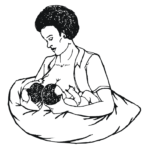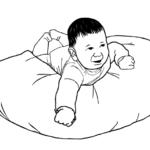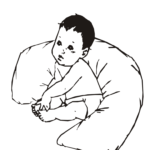Here’s a question from Marcy in Richmond Hill, ON:
Q: I’m expecting my first child in the middle of April. I’ve tried to read up on breastfeeding but some things you read conflict – for example, some say you should feed the baby from both breasts at a feeding, while others say that one breast is enough. Who’s right?
A: Good question, Marcy! For a first baby, it’s generally advised that you begin your breastfeeding experience by feeding from both breasts at each feeding. On the first side, feed until you notice the sucking and swallowing slowing down or stopping. Then remove the baby from the breast by inserting your little finger into the corner of the baby’s mouth to break the suction. Then burp the baby to remove any swallowed air. If baby is sleepy, many mothers will change the diaper at this time to wake the baby up. Then, offer the second breast. Most babies will take some from this breast until they fall asleep. At the next feeding, offer the breast that you fed from last at the previous feeding. Some mothers use the trick of putting a safety pin on their bra on the side they finish on to remind them to use this breast first next time! Doing this, particularly as your milk is coming in (this typically takes about 6 weeks) gives both breasts equal stimulation and promotes a good breastmilk supply.
Once your breastmilk supply is well established, some mothers find that the baby is satisfied with one breast per feeding, while others continue to offer both breasts at each feeding – you’ll soon become the expert on what your baby needs!
Nancy Lahn RN
Developer of the Cozy Cuddles Nursing Pillow
Originally posted 2016-03-31 12:45:59.

 A: Thanks for inquiring about the use of the Cozy Cuddles Nursing Pillow for twins! Yes, absolutely you can nurse both babies at once using our pillow – many, many customers have done just that!
A: Thanks for inquiring about the use of the Cozy Cuddles Nursing Pillow for twins! Yes, absolutely you can nurse both babies at once using our pillow – many, many customers have done just that! You can also feed them in three other positions – the front cross (both in the cradle hold), one in football hold and one in cradle hold, or the upright latch where the Mom uses the “laid-back” position. In this graphic, Mom is nursing one baby in the laid-back position but both twins can be nursed at once positioning them this way.
You can also feed them in three other positions – the front cross (both in the cradle hold), one in football hold and one in cradle hold, or the upright latch where the Mom uses the “laid-back” position. In this graphic, Mom is nursing one baby in the laid-back position but both twins can be nursed at once positioning them this way. Here
Here  you can see other uses for the Cozy Cuddles Nursing Pillow as well. They can lie on it on their back from newborn to be propped up (to see what’s going on in the room or to play with their “play gym” toys, for supervised “tummy time” once they gain neck strength, and later (around 6 months) for giving them support as they learn to sit up. Many parents of twins use two Cozy Cuddles pillows for these purposes.
you can see other uses for the Cozy Cuddles Nursing Pillow as well. They can lie on it on their back from newborn to be propped up (to see what’s going on in the room or to play with their “play gym” toys, for supervised “tummy time” once they gain neck strength, and later (around 6 months) for giving them support as they learn to sit up. Many parents of twins use two Cozy Cuddles pillows for these purposes.